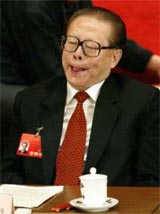|
Security
Council to Debate War Under Veto Threats
 |
|
"France
will vote no" whatever the circumstances, vowed Chirac
|
UNITED
NATIONS, March 11 (IslamOnline.net & news Agencies) - The U.N.
Security Council was preparing on Tuesday, March 11, to debate a new
resolution to give the United States and Britain the authority to wage
war on Iraq with the threat of a veto by France and Russia hanging over
their heads.
As
the first session approached, it was emerging that the Americans would
be hard-pressed to scrape together the nine votes it needed to lend
legitimacy to its impending assault on Baghdad with China expressing
opposition and Pakistan planning to abstain, reported Agence
France-Presse (AFP).
France,
which has led the anti-war camp, was determined to vote against the war
resolution and had been busy lobbying African members of the Council to
block U.S. attempts to push through a new resolution, claiming to have
won the support of Guinea and Cameroon.
British
Prime Minister Tony Blair, who has also dispatched an envoy to woo
council members Guinea, Cameroon and Angola, urged the French and
Russians not to use their veto as it would let Iraqi President Saddam
Hussein "off the hook".
"France
will vote no" whatever the circumstances, French President Jacques Chirac
said in a television interview on Monday, March 10.
Moscow
Opposes Even If Ultimatum Delayed
 |
|
"Russia
is very much against this resolution, we will vote against
it," pledged Ivanov
|
Russia
will oppose the U.S.-British resolution seeking U.N. approval for
unleashing war on Iraq even if the March 17 ultimatum for Baghdad is
delayed, Russian Deputy Foreign Minister Yury Fedotov was quoted as
saying by Interfax on Tuesday.
Fedotov
said Russia was aware of a British proposal to amend the draft
resolution giving Iraq a few more days to comply with U.N. disarmament
demands, the news agency reported.
But
he added: "Russia continues to believe strongly that no new
resolutions on Iraq are needed."
"The
international inspectors have a sufficiently strong mandate under
resolutions 1441 and 1284, and the international community's task is to
help them fulfill their mandate and ensure the efficiency of the
inspectors' work," the deputy foreign minister said.
Russian
Foreign Minister Igor Ivanov continued his efforts to drum up support
for the Russian position on Tuesday, holding telephone talks with his
counterparts in Chile, Mexico and Pakistan -- each seen as holding
crucial swing votes as non-permanent members of the Security Council.
A
foreign ministry statement said Ivanov also held telephone talks during
a visit to Iran with his French counterpart as well as the foreign
ministers of China and Germany, which have also come out in support of
the Russian position.
Reiterating
determination to wiled the veto power if necessary, Ivanov confirmed
madder it clear that "Russia is very much against this resolution,
we will vote against it."
"We
invite the USA to opt for a political solution, and this is doable. Most
countries would like the issue to be solved by political means," he
stressed.
"All
the conditions are set for Iraqi disarmament to take place as soon as
possible through political means."
Ivanov
also said Russia was against U.S. efforts to oust Saddam, saying that no
United Nations resolution had asked for a regime change in Iraq.
"Unnecessary"
 |
|
"Our
stand does not change. It is unnecessary to have a new
resolution," said Jiang
|
Chinese
President Jiang Zemin told Chirac Tuesday that he opposed a new U.N.
resolution authorizing force against Iraq, arguing it was
"unnecessary".
Jiang
made the remark in a telephone conversation with Chirac, Xinhua news
agency said, citing sources at the Foreign Ministry.
"Our
stand does not change. It is unnecessary to have a new resolution,"
said Jiang, adding that the crisis should be settled by political means
within the framework of the United Nations.
Jiang
late Monday told Bush by telephone that the Iraq crisis must be resolved
through the Security Council, but declined to say whether Beijing would
resort to a veto.
China,
one of the U.N. Security Council's five permanent members, has
previously stated its opposition to war in Iraq but has not yet
threatened to use its veto.
Jiang
also discussed Iraq with German Chancellor Gerhard Schroeder in another
telephone call on Monday evening.
Both
sides agreed that the U.N. inspectors' work should not be abandoned.
After
sitting on the fence for months, China has increasingly taken an
anti-war stance alongside France, Russia and Germany.
Guinea,
Cameroon To Abstain
Guinea
and Cameroon, two African non-permanent members of the Security Council,
will abstain in a vote in the U.N. Security Council on a second Iraq
resolution, a diplomatic source in Paris said Tuesday.
"Guinea
and Cameroon have confirmed their earlier positions which logically
pointed them towards abstention" in the controversial
U.S.-sponsored resolution, which could come before the Council later
this week, the source said.
As
regards Angola, the third non-permanent African member of the Security
Council, "that country has not given any indication" how it
will vote.
"It
is completely undecided and apparently very hesitant," the source
added.
Angola,
Cameroon and Guinea have been subject to intense lobbying by both France
and Britain -- who are on opposing sides in the diplomatic battle over a
new U.N. resolution which would authorize the use of force against Iraq.
French
Foreign Minister Dominique de Villepin on Monday made a lightning tour
of the three countries to try to swing them in France's direction, while
British junior foreign minister Valerie Amos is currently on the
continent marketing Blair's pro-war position.
Annan
Urges Unity
U.N.
Secretary General Kofi Annan urged the United Nations Security Council
Tuesday to reach a broad consensus on Iraq to maintain unity, as signs
of a divergence of opinion surfaced between London and Washington.
The
council faces a "momentous choice," Annan wrote in a Wall
Street Journal commentary piece, warning that if action against Iraq is
taken without its authority, "the legitimacy of that action will be
widely questioned, and it will not gain the political support needed to
ensure its long-term success after its military phase."
"However
this conflict is resolved, the U.N. will remain as central as it is
today," Annan declared.
But
he added: "We should do everything we can to maintain its
unity."
War-mongers
Bush and Blair have repeatedly warned they would disarm Iraq by force
even if they failed to win Council backing for military action, and the
White House said the use of a veto would be "from a moral point of
view, more than a disappointment."
The
new draft resolution seeks U.N. authority to disarm Iraq by force unless
the Council decides by March 17 that it is cooperating fully with U.N.
weapons inspectors.
|